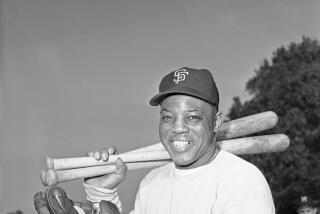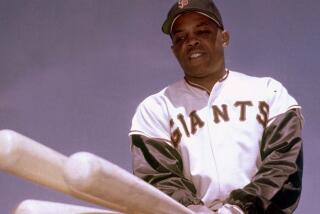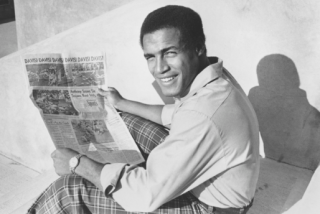Woody Hayes, Ohio State Legend, Is Dead : Controversial Football Coach Dies in His Sleep at 74, Apparently of Heart Attack
Woody Hayes had been out of football for more than eight years when he died Thursday at 74. He hadn’t planned it that way. He had hoped to die with his cleats on.
“I’ll never quit,” the old coach said two years before Ohio State fired him in 1978. “When I leave, I’ll do it by dying on the 50-yard line at Ohio Stadium.”
For the record:
12:00 a.m. March 14, 1987 For the Record
Los Angeles Times Saturday March 14, 1987 Home Edition Sports Part 3 Page 12 Column 4 Sports Desk 2 inches; 40 words Type of Material: Correction
Grambling football Coach Eddie Robinson has won more games than any other college coach, 336. The late Paul (Bear) Bryant is second with 323. Robinson’s name was inadvertently left off a list of successful college coaches in the story on the death of Woody Hayes in Friday’s editions.
A friend asked him: What if you’re losing?
“Then I won’t go,” Hayes said.
Hayes’ physician, Robert Murphy, said that the volatile coach apparently died of a heart attack. His wife, Anne, found him dead in bed at their home in Upper Arlington, near the Ohio State campus, when she awoke at 6 a.m.
The last, inactive years were the hardest for Hayes, who coached the Buckeyes for 28 seasons before they sacked him for hitting a Clemson player who had just intercepted an Ohio State pass, costing the Buckeyes a chance to come back in the 1978 Gator Bowl. Privately, he said his life ended that night. But publicly, he could joke about it--sometimes.
He insisted, for example, that when he lashed at Clemson noseguard Charlie Bauman with his powerful right forearm, he was only trying to knock the ball out of the player’s hands.
“If I’d meant to hit him, I would have thrown a left,” said Hayes, a southpaw.
The incident ended his 42-year career as a football coach, a career filled with two kinds of trouble--the trouble he made for others by winning most of his games and the trouble he made for himself with his temper tantrums.
His Buckeye teams had a 205-61-10 record and he coached 13 Big Ten champions. He took eight of his teams to the Rose Bowl, winning four times. His teams were always vigorously competitive and physical, but that apparently wasn’t enough for Hayes. Repeatedly, he also took on his critics.
During his tempestuous career, Hayes punched not only football players--his own and other teams’--but also newspaper reporters, press photographers and TV cameramen. He was usually good for a harsh quote attacking the media.
He was even an early adversary of the NCAA, which, acting through the Big Ten, put Ohio State on probation in 1957 after citing Hayes for illegally lending money to players. The Big Ten put him on probation again in 1977 for a sideline altercation with an ABC-TV cameraman during a game at Michigan.
Hayes also was chastised in 1959 by the American Football Coaches Assn.’s ethics committee. He had been involved in a ruckus with two California sportswriters after a 17-0 loss to USC.
And The Los Angeles Times filed assault charges against Hayes, charging that he pushed a camera into the face of photographer Art Rogers before the 1973 Rose Bowl. The charges were later dropped.
Jim Marshall, who played for him at Ohio State, was asked once what he remembered most about his college football days.
Marshall thought a moment and said: “I remember Woody would beat up on sportswriters who tried to sneak into practice.”
Hayes’ feud with the press began when he forbade his players to talk with reporters. Frequently, the coach himself was inaccessible. After big games, he sometimes wouldn’t come out for 30 or 40 minutes. And after one Rose Bowl defeat, he never did come out. He hasn’t commented on that game yet.
But from his first season at Ohio State, 4-3-2, through his 28th, 7-4-1, Hayes was a sound, thorough, hard-working coach, a brilliant recruiter and gifted organizer.
Several months after he was fired, he telephoned Clemson’s Bauman--but not to apologize for slugging a young player.
“He called to ask what defense we were in at the time,” Bauman said.
When a protege, Michigan Coach Bo Schembechler, said later that an Ohio State coach really ought to tell an opposing player he regretted hitting him, Hayes snapped:
“Why should I? I don’t apologize for anything.”
And till the day he died, he never did.
But, paradoxically, he never criticized the university for letting him go. At no time did he seem to be so much as mildly bitter toward the school that dumped him after he had faithfully served for so long. Last spring, he delivered the graduation address at the school.
A campus street that runs alongside Ohio Stadium was renamed Woody Hayes Drive, and Ohio State later bestowed its Distinguished Service Award upon him.
“I’m only bitter about one thing,” he once said. “I thought we had that danged (Clemson) game won.”
Eventually, the way Hayes told the story on the banquet circuit, the incident invariably got one of his biggest laughs.
Recalling Bauman’s interception that kept Clemson in front, 17-15, Hayes used to say: “(Former Texas Coach) Darrell Royal often told me that only three things can happen when you throw a pass--and two are bad. But I’ve got news for Darrell. Four things can happen--and three are bad.”
Hayes toured the country making speeches for a living in the years after he left Ohio State, sometimes appearing seven and eight times a week.
His was often the same message, and two years ago, speaking to a high school crowd, he was again citing the three things his players had learned from him playing football.
“First, when you get knocked down, you get up,” Hayes said. “Second, you go as a team.”
Then he paused for a moment, and finally said he couldn’t remember No. 3.
“At my age, you need to write things down,” he said.
The third point, which any Ohio State player could have recited from memory, always used to be Hayes’ favorite: “Nothing that comes easy is worth a dime.”
A former football player himself, Hayes in his prime was a fit, energetic 220-pounder who on the coldest November days--as smoke rose from the university’s big smokestacks--strode the Ohio Stadium sideline in his shirt sleeves.
He wasn’t quite as healthy as he seemed, though. He had diabetes, he weathered a heart attack in 1974 and two stomach operations in 1981--the first to remove his gall bladder and the second to remove a sponge that the doctors had inadvertently left behind the first time.
Joked Hayes of the second operation, only two weeks after the first: “I don’t know how a doctor could make a mistake. I coached for 40 years and never made one.”
He suffered strokes in 1984 and 1985, and a heart attack in 1985.
But he always projected a macho image. A military student, he was an avowed admirer of Gen. George Patton, the famed U.S. Army commander in World War II. The only picture in Hayes’ office was of Pete Rose, the hardy player-manager of the Cincinnati Reds.
During World War II, when he was in the Navy, Hayes once took on--and defeated--the bouncer in a West Indies bar.
Not that Woody was there to drink. “He just came in to get us out,” said a former member of Hayes’ crew, Duane Vobach.
For nearly three-quarters of a century, Wayne Woodrow Hayes spent most of his days and nights in the state he loved the most. Born Feb. 14, 1913, in Clifton, Ohio, he grew up nearby in Cy Young’s hometown, Newcomerstown, where Hayes’ father was the superintendent of schools.
After graduating from Denison University in 1935, Hayes began as an assistant coach at Mingo Junction High School and later coached at Denison and Miami of Ohio before taking over the Buckeyes in 1951.
His lifetime record as a coach was 238-72-10. Only Paul (Bear) Bryant, with 323 victories, Amos Alonzo Stagg with 314 and Glenn (Pop) Warner with 313, won more major college football games. He was the only Big Ten coach whose teams went to the Rose Bowl four consecutive years.
His teams won two news service national championships and three other national polls. His best teams played in three decades--1954, ‘57, ‘61, ‘68, ’70 and ’73.
Coach of the Year in both 1957 and 1975, Hayes was also runner-up twice. He coached 57 first-team All-Americans and four Heisman Trophy winners.
To the end, Hayes maintained his residence in suburban Columbus, where he always listed his number in the phone book. Fans, friends, cranks, strangers, at least two U.S. Presidents and the sportswriters of 50 states called him there at all hours. And he was usually cordial--until angered by a provocative question.
Far merrier than he seemed to newspaper readers, Hayes would sign autographs by the hour--in the off-season--and he liked to tell about the woman who approached him one day at the peak of his career, when he was the idol of half the adults of Ohio and most of the kids.
Showing Hayes two pictures of himself, the woman said: “Would you please autograph these for my babies back home?”
“Sure,” he agreed.
“Make one out to Terry,” she said.
“Certainly,” Hayes said. “And how old is little Terry?”
“He’s 47,” the woman said.
Hayes is survived by his wife, whom he always called “my best friend,” and their son, Stephen, a judge. An Ohio judge, of course.
The funeral will be at 4 p.m. CST Tuesday at First Community Church in Columbus.
THE ACCOMPLISHMENTS
SOME OF THE HIGHLIGHTS IN THE COLLEGE FOOTBALL COACHING CAREER OF WOODY HAYES:
1947--Coached Denison to an unbeaten season in nine games, the middle of three seasons at his old school. He won 19 games and lost 5 at Denison. His 1948 squad also went undefeated in eight contests.
1949-50--At Miami (Ohio) University, his teams won 14 and lost 5, winning the Mid-American Conference championship once.
1951--His first of 28 seasons at Ohio State, the longest tenure for any football coach at the Big Ten school. However, the Buckeyes were only 4-3-2 in Hayes’ opening season.
1954--His first national championship team rolled past nine straight regular season opponents for the first of his 13 Big Ten champions or co-champions and beat USC, 20-7, in the Rose Bowl.
1968--A second national championship, which was built on a 10-0 record that included a 50-14 trouncing of rival Michigan and a 27-16 decision over USC in the Rose Bowl.
1973--His last undefeated squad compiled a 10-0-1 record. The Buckeyes played Michigan to a 10-10 tie for a league co-championship. They went on to rout USC, 42-21, in the Rose Bowl.
Coaching Record--238-72-10, .759 Pct. (19-6-0 at Denison; 14-5-0 at Miami (Ohio); 205-61-10 at Ohio State).
Big Ten Championships--1954, 1955, 1957, 1961, 1968, 1969 (tie), 1970, 1972 (tie), 1973 (tie), 1974 (tie), 1975, 1976 (tie), 1977 (tie).
THE CONTROVERSIES
SOME OF THE LOWLIGHTS IN THE COLLEGE FOOTBALL CAREER OF WOODY HAYES:
1956--His personal loans of about $400 annually for five years to his players, costing the school a one-year probation from the Big Ten Conference office and Rose Bowl ineligibility that season.
1958--His eviction of Big Ten skywriters and officials, including the late conference Commissioner Kenneth (Tug) Wilson, from a preseason practice. School officials later apologized for Hayes’ action.
1959--His locker-room altercation with two California sportswriters that resulted in a dressing down for Hayes from the American Football Coaches Assn.’s ethics committee. Dick Shafer of the Pasadena Star-News said Hayes hit him and shoved him against a locker-room wall after a 17-0 loss to USC. Al Bine of the Los Angeles Examiner said Hayes swung at him, but missed. Hayes said he did not hit the writer, but pushed him.
1973--Art Rogers, a Los Angeles Times photographer, charging Hayes injured his face when, according to Rogers, the coach pushed the photographer’s camera back into his face just before the 1973 Rose Bowl. Assault charges against Hayes were later dropped in a Pasadena court.
1977--An ABC-TV cameraman, Mike Freedman, saying Hayes punched him on the sidelines after an Ohio State fumble with four minutes left in a 14-6 defeat at Michigan. It led to Hayes’ second probation from the Big Ten office.
1978--Hayes’ slugging of Charlie Bauman, on national television, after the Clemson noseguard’s interception in the last two minutes of the Buckeyes’ 17-15 loss in the Gator Bowl. Hours later, Hayes was fired by Ohio State Athletic Director Hugh Hindman.
More to Read
Go beyond the scoreboard
Get the latest on L.A.'s teams in the daily Sports Report newsletter.
You may occasionally receive promotional content from the Los Angeles Times.










